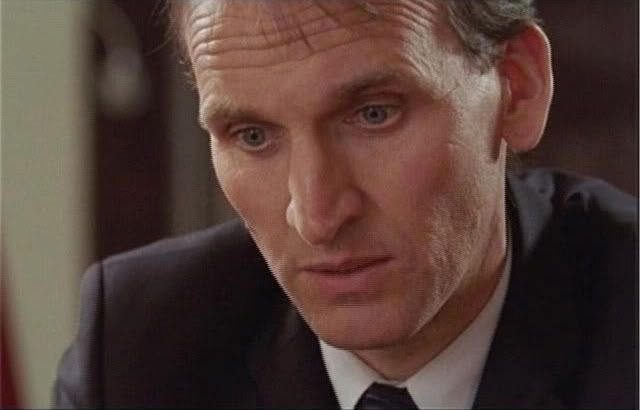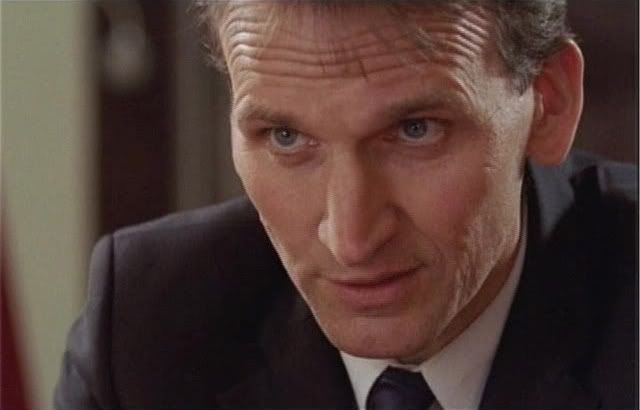 Returning to the theme of religion that started Thought Control session, the first project from the post-'Doctor Who' era,
Returning to the theme of religion that started Thought Control session, the first project from the post-'Doctor Who' era,Perfect Parents
TV film from 2006, directed and written by Joe Ahearne.
Chris Eccleston plays Stuart, a father who wishes all the best for his daughter, but his actions start an avalanche of disastrous events. For this role Eccleston won Best Actor at Rome Fiction Fest 2007 (See Timeline).
Eccleston and Ahearne met filming 'Doctor Who', and already in 2005 they were supposed to shoot a film together. The feature was called 'Double Life' and billed as (probably sci-fi) romcom, but it fell through late in pre-production. The project was abandoned completely, and Joe Ahearne set to writing a new script. Eccleston's casting was confirmed in April 2006, and 'Perfect Parents' aired during Christmas holiday same year.
The story evolves from real-life fact that a certain percentage of non-religious parents cheat in order to get their children into better - and strictly Catholic - schools. Writer and director Ahearne doesn't stop at this, among other things, he includes a priest with dubious past and looks behind the façade of said schools.
While it is possible to see it in broader terms than all-out criticism of religion, paradoxically, all the while dealing with approximately relevant, non-fictitious topic, the film quickly departs from reality as the action progresses.
Seen from one side, this is merely a blunt dial-a-controversy - that makes little use of, for example, well-crafted depiction of family life, and fails its characters with wobbly logic. From the other, the film might have an aim outside itself - but does the story bear enough in it to feed a discussion and not appear simply sermonizing?



3 comments:
I'll wade in, since I have seen this one. Excellent assessment of the film's flaws: if the cliche of the one-time pedophile priest weren't bad enough, the plot suddenly becomes a silly (un)thriller about the serial blackmailer, and loses all hope of redemption as a coherent story.
The film felt rushed and superficial to me, except for one tiny kernel of an interesting, unfulfilled idea: young Lucy being drawn to the Catholic faith to the puzzlement of her unbelieving parents. I have no idea, though, how that story might have played out if explored to the full, because we don't get a feeling for the family members as individuals, let alone the family as a unit.
A great shame, really, because there were so many talented people involved in the film.
Joan-forgive the reply from my phone -will post more later - I do agree the film had some cliches-I was drawn to the character of Lucy also-she was so much a part of her parents decision and even deception. I felt that had the film been made in America her character would not have been afforded the respect of her choices and her own opinions.I was impressed at how strongly her character was written.
That it's rushed is also evident on the technical side, which is quite poor and not thought-through, relying, again, on structural clichés - and with this stunt-plot it doesn't make things any better.
I must disagree about the family depiction - while it could be more individualised, as it is it shows well a very average family. And maybe the credit goes to Eccleston, and not the writer, that I find some echoes of supposed choices Stuart must have made earlier in his life. But certainly film's not about persons (can't be when most of them are cheap imports).
And here's the main problem, that the film just hops to the next plot point, but doesn't use the characters to take it there (what could also rescue them, not just the story).
For example, when Stuart with two words dismisses the possibility to change something at the old school - and there goes the chance to tackle all the questions about parents' involvement or, say, class prejudices that complicate it. It's just one of many available topics that are completely neglected.
And absolutely, child, discovering faith on her own, is such an intriguing story. Again, so many possible conflicts that would make a great drama. And this film offers just a glimpse - Lucy prays/threatens God that she won't talk to him again, if her father dies. As her father doesn't die, will now her faith be built on this falsified image of how religion works?
Definitely film's worth an award for unused talent and mislaid narrative potential.
Post a Comment